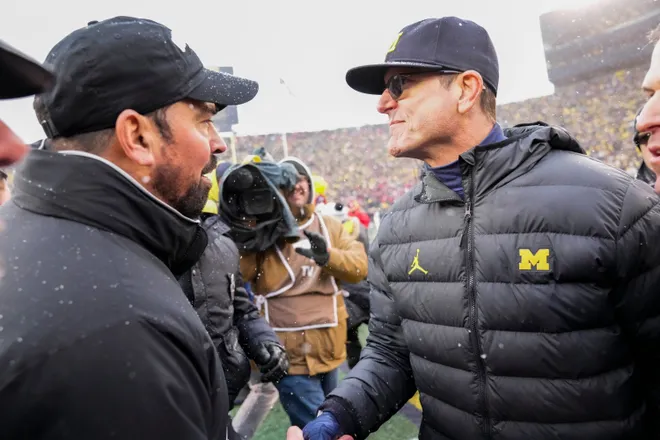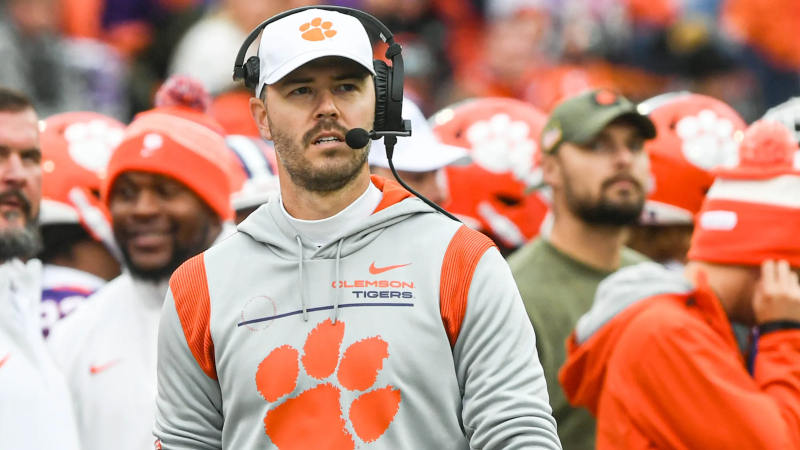Stakes are clear for Michigan: Beat Ohio State or be labeled a gigantic fraud
Michigan’s football program has won 23 consecutive Big Ten games, two conference championships and asserted a level of dominance over Ohio State that has at times made the Buckeyes’ fan base question whether Ryan Day runs a tough enough program to compete at the highest level of the sport.
But if the Wolverines lose to Ohio State on Saturday, it will all look like a gigantic fraud.
That's the unvarnished, and perhaps unfair truth of the stakes this year. In some ways, it’s bigger than the rivalry. It’s more relevant than who plays in the Big Ten title game next week. And given the context of what’s been happening at Michigan lately, it’s far more urgent than even winning a national championship.
The Wolverines scored their 1,000th victory last week, more than anyone else in college football history. They have never needed a win more than this one.
Hyperbole? Absolutely not. Regardless of what you think about the sign-stealing scandal that has embroiled the program for the last month and will keep head coach Jim Harbaugh out of Michigan Stadium for the last of his three-game suspension, the consequences of losing this time to Ohio State are crystal clear.
Without this victory, on this day, under these circumstances, the conclusion that Michigan flipped this rivalry by cheating will be served up for Buckeye Nation like a carved turkey placed in front of an offensive line.
And Michigan will never live it down.

Truth is, there’s no real way to quantify what kind of edge the Wolverines gained from Connor Stalions, the now infamous recruiting analyst who was apparently spending most of his time selling used vacuums on the internet and dispatching his friends and family all over the country to film the sidelines of Michigan’s future opponents.
Since Stalions’ activities came to light, there’s been a lot of litigation in the media and among the coaching community about whether violating the NCAA rule against in-person scouting in this matter is a big deal, a minor transgression or a total nothingburger.
It’s an interesting discussion because every program steals signs or tries to some degree, and because the NCAA has discussed getting rid of the rule in recent years because it was originally instituted as a cost-saving measure and may not offer much of a competitive advantage anyway. There has even been this incredibly granular, inside baseball-ish discussion about why it’s OK for coaching staffs to share information among each other — information that would have been gained in part through in-person scouting — but not for Stalions to buy tickets to games like any member of the public.
These are all valid things to talk about in an academic sense. If the NCAA simply got with the times and allowed helmet radio communication from the sidelines to players like the NFL has, this would all be a moot point. You simply wouldn’t need elaborate signals to communicate plays, and thus the importance of decoding them would instantly go away.
OPINION:Michigan football program revealed as either dirty or exceptionally sloppy
But none of that is particularly relevant to the perception of how much Stalions' work helped Michigan go from a program that looked like it was ready to fire Harbaugh a few years ago to Ohio State’s new overlord.
What’s more likely: That Michigan got really good really quickly because of a raft of NFL draft picks or because of a $55,000-per-year employee who went way too far? Of course it’s the former, but it also would be naive to ignore the fine margins that decide football games. If there was no value in what Stalions was doing, why would he go to such great lengths to do it?
It would be fascinating to know what Stalions thought that value was, and maybe one day we’ll find out if he publishes a book or agrees to a Netflix documentary or something of that nature.
But for the time being, we’re unlikely to learn much about his mindset because the moment Michigan fired Stalions, he was no longer obligated to participate in the ongoing NCAA investigation. At this point, there’d be no reason for him to do so. His obstruction is going to cost him a very big NCAA penalty, but his career in college football is over anyway. He’ll only talk if he wants to talk.
So the rest of us are left with a thousand loose ends to try to weave together, including whether anyone else at Michigan knew what was going on. At minimum, though, Michigan appears to have committed the sin of failing to properly vet Stalions or ask the basic questions about how he got so good at decoding opponents’ signals.
And he was apparently so good that nearly every other program in the Big Ten, Ohio State in particular, suspected something unusual was afoot.
How Michigan scandal has affected Ryan Day
Without wading into who put Stalions on the NCAA’s radar — the origins of the private investigative firm that dumped a cache of evidence into the enforcement staff’s lap remain a mystery — this development becoming public knowledge has undeniably been one of the biggest wins of Day’s coaching career.
After last season’s 45-23 beatdown in Columbus, it would be incorrect to say Day was on the hot seat but completely fair to question whether he was the right guy to get the Buckeyes where they want to go. For the second straight year against Michigan, Ohio State looked soft, and Day seemed unsure of himself on the kinds of high-pressure calls that big-time coaches have to make in these games.
Ohio State’s near-miss against Georgia in the College Football Playoff semifinals restored some of his credibility, but let’s call it like it is: Nobody has gained more than Day from the notion that Michigan cheated. Whether Stalions had anything to do with it or not, the perception of those losses is a bit different if the Wolverines had an unfair advantage.
So Saturday is big for Ohio State as well. Stalions is gone, and so are the excuses. Day deftly avoided all questions this week about his counterpart, but did it in a way to let everyone know he’s clearly irked by Harbaugh and probably thinks Michigan cheated.
That comes with some risk, too. If the Wolverines are better this time, there’s no excuse. Nobody will be able to say it was because of ill-gotten information if they do exactly what they did to the Buckeyes the last two years.
It’s bigger for Michigan, though. With an NCAA investigation still ongoing, Harbaugh's future up in the air and most of the Wolverines’ key players headed to the NFL, this feels a bit like a last stand. If Harbaugh leaves or is fired, Michigan will of course find another good coach and continue to recruit good players. The rivalry will go on, just as it has for a century.
But Saturday is pretty much a one-game referendum on this entire three-year run for Michigan, which sprang almost out of nowhere following the despair of eight consecutive losses to Ohio State.
However you feel about cheating, sign-stealing or the various forms of hijinks that are embedded in the culture of college sports, Stalions cheated and the Wolverines got caught. That means there's only one way to buck the narrative that Michigan’s ascent was a scam. It all comes down to Saturday.

Disclaimer: The copyright of this article belongs to the original author. Reposting this article is solely for the purpose of information dissemination and does not constitute any investment advice. If there is any infringement, please contact us immediately. We will make corrections or deletions as necessary. Thank you.







